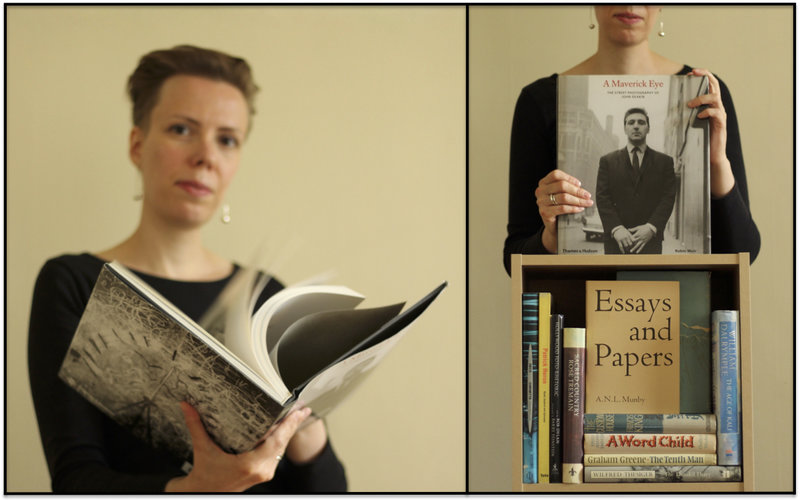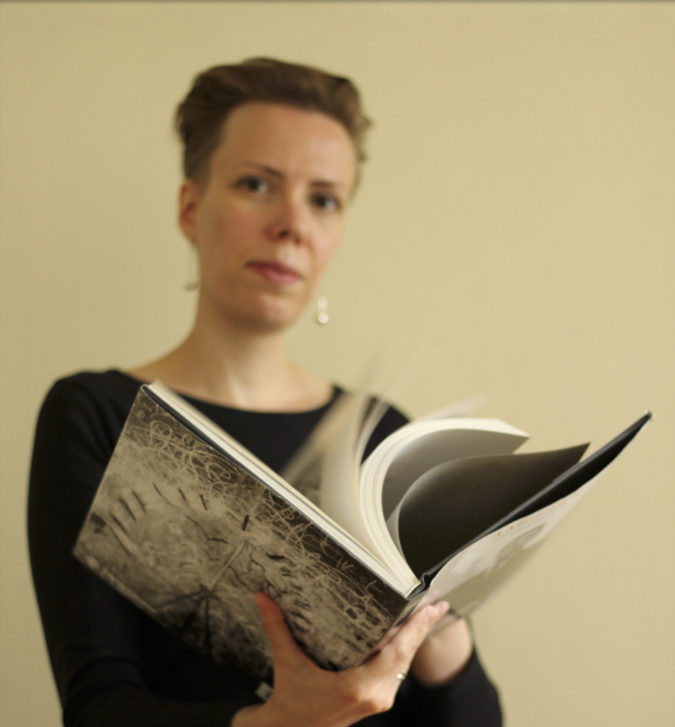
Anke Timmermann speaks about her career and her interest in tracing the links between alchemy and modern medicine.
There is a great benefit of stepping out of our immediate surroundings and understanding how the big questions have been dealt with in history.
Anke Timmermann
Anke Timmermann is a culture detective, discovering historical texts which connect past knowledge to the present. An independent antiquarian bookseller, she specialises in the history of science, scientific exploration and recipe books, subjects that represent a continuation of her academic studies on the history of alchemy and medicine.
With alchemy linked in the popular imagination to magic, Anke has been keen to trace its historical roots and correct some common myths. In fact, she says, alchemy’s links to the occult are a fairly recent development. Between the 15th and 17th centuries alchemy was very much a vital stepping stone to the foundation of modern chemistry.
Anke [2003], who is from northern Germany, became interested in alchemy while doing her first degree at Heidelberg University. She took a course in metaphysical poetry, which was where she first encountered metaphorical references to alchemy. She was intrigued. “There was something going on that was not about mere metaphor. It seemed to refer to some aspect of culture which the poets’ readers would understand,” she says. She was working as a library assistant at the time, so she looked up alchemy, but couldn't find much information. She asked her professors, but they didn't know much about it either. So she went to a bookshop and there she met a bookseller who invited her to a graduate seminar on the history of medicine and alchemy.
Professor Joachim Telle, a scholar in Germanic studies and expert on the alchemist and 'father of modern medicine' Paracelsus, led the seminar, which was attended by postgraduates, journalists and other writers. He gave Anke a list of books to read, told her to write reviews of them and to come back the following week. She passed the test, proving she had the critical skills necessary to contribute to the seminar. The professor then gave her reproductions of 16th-century alchemical manuscripts and encouraged her to learn how to read them. “He was very generous with his knowledge if he knew you were doing your part,” Anke recalls. He knew she was doing English, so he steered her towards doing more research into English alchemy, about which there were not many recent studies.
Anke did her master’s thesis on Yeats and his activities in The Hermetic Order of the Golden Dawn, an occult circle of the turn of the 20th century. She studied the mythological themes behind Yeats’ poetry – especially tarot cards, ancient symbolism and alchemy – teasing out the history from the myth.
Recipes in rhyming couplets
She knew by then that alchemy was where her interests lay. Professor Telle supported her application to do an MPhil in the UK and she was accepted on the research-based master’s course at the University of Glasgow. It was her first opportunity to work intensely on manuscript archives and she produced a critical edition of an alchemical poem.
Tracing the medieval and Renaissance history of alchemy was difficult because alchemy was not a university discipline and was not officially documented. Anke studied alchemical recipes written in the form of poems, which were copied many times between the 15th and 17th centuries.
“They are recipes in rhyming couplets. The important information is mostly found in the rhyme words,” she says. “By analysing the changes from one recipe copy to another you can see what was important to alchemists and what was not, such as what the proportion of ingredients should be or how long to distil or heat a material for. Some things, like colour changes, might seem metaphorical, but they are not – they describe what the alchemist actually saw. The changes in texts really do tell us something important about a part of scientific history.”
For her PhD at Cambridge, where she was based at Robinson College, Anke had a much wider range of manuscript collections to study, including the notebooks of a 16th-century London doctor who had preserved alchemical texts with a view to using alchemy in the treatment of his patients. She also analysed a number of illuminated manuscripts containing alchemical poems.
Anke argues that studying alchemy provides a window into an important phase in the development of human knowledge and early modern scientific culture. “There were discoveries being made that still have a bearing on what we do today,” she explains, “and there is comfort in knowing that people in the past had many of the same questions we do now, for example, questions about how we can live longer. In the 15th and 16th centuries the so-called ‘elixir of life’ was thought to remove illnesses and imperfections from the human body, allowing men and women to live to a very old age. Today we try to find cures for cancer. There is a great benefit of stepping out of our immediate surroundings and understanding how the big questions have been dealt with in history.”
From the craft of alchemy to the practice of modern medicine
After Cambridge, Anke got a job at the Chemical Heritage Foundation in Philadelphia, who were building the first museum of the history of chemistry in the US. Anke ran their fellowship programme, worked with the book collections and did a lot of outreach work. “It was a unique opportunity,” she says.
She missed academia after two and a half years, however, and won a fellowship back in Glasgow, researching and editing the correspondence of Bess of Hardwick, putting together the exhibition “Unsealed: The Letters of Bess of Hardwick” at Hardwick Hall and producing a related podcast series. From Glasgow she moved to the Medical University of Vienna, to work on the large holdings of manuscripts in Viennese libraries which show the crossover between the craft of alchemy and the practice of medicine. While researching, Anke taught medical students about the history of medicine and also published articles and a book based on her PhD, which is available via open access. She also gave a talk on alchemy and Harry Potter to a public audience. Her desire to spread knowledge beyond the academy is something that she attributes in part to her Gates Cambridge experience.
In 2013 Anke held a fellowship at the Max Planck Institute for the History of Science, where she investigated alchemical illustrations. “There is so much information concealed in seemingly simple drawings of alchemical equipment,” says Anke. These often show instruments, furnaces and techniques that would be difficult to describe in words alone. “The illustrations were the missing link – missing because they are rarely recorded in catalogues” she adds. From Berlin Anke moved back to Cambridge, where she had won the Munby Fellowship in bibliography to work in the University Library and catalogue alchemical works and illustrations, many of which she identified for the first time.
Detective work
When her Munby Fellowship at Cambridge ended, Anke was keen to keep working with books and manuscripts in the UK. “I had the option to stay in academia, but there are so many books and manuscripts that academics do not see. Large parts of historical books and manuscripts are in private collections and may be on the market for only a short time. That is where the real detective work takes place, in the connections between private collections, booksellers and institutional libraries,” she says.
So Anke decided to launch herself into the book trade. She applied to Quaritch, one of the oldest antiquarian book firms in the country, who created a traineeship for her. Last year she catalogued the conductor Christopher Hogwood’s collection of recipe books. “I see it as my mission to uncover the history that the world would lose otherwise. It is very easy for a book to not be recognised for what it is and fall into disrepair or just be forgotten,” says Anke, who left Quaritch in July to set up her own business A. T. Scriptorium. “There is a real sense that you are preserving a country’s cultural heritage.”

Anke Timmermann
- Alumni
- Germany
- 2003 PhD History & Philosophy of Science
- Robinson College
I have been working internationally with historic objects and cultural heritage for more than 20 years. Following my PhD in History of Science at Cambridge I held positions at the Chemical Heritage Foundation (now Science History Institute) in Philadelphia, PA; worked on the digital edition of Bess of Hardwick's correspondence at the University of Glasgow; and researched scientific manuscripts and introduced medical students to the history of their discipline at the Medical University of Vienna.
In 2013-14 I was the Munby Fellow in Bibliography at Cambridge University Library, and then launched a career as an antiquarian book specialist at one of the oldest antiquarian booksellers in London, Bernard Quaritch Ltd. Since 2018 I have been the co-founder and -owner of Type & Forme Rare Books & Manuscripts in Isaac Newton's hometown, Grantham.
I serve on the Council of the Bibliographical Society (UK) and am also a judge for the Rose Book Collecting Prize (Cambridge University) and the David Murray book collecting prize (Glasgow University). Alongside my work with institutions and collectors I also write on book history and related subject.
IN THE MEDIA
Darwin Notebooks returned:
https://www.typeandforme.com/index.php/2022/04/11/charles-darwins-notebooks/
(see also my interview with the University Librarian Dr Jessica Gardner and the Director of the Darwin Correspondence Project Prof. Jim Secord in Fine Books & Collections: https://www.finebooksmagazine.com/issue/darwin-notebooks-and-letters-reunited-anniversary-year)
Why Rare Books Matter to a Younger Generation: https://ilab.org/article/new-to-ilab-speaking-to-anke-timmermann-of-type-forme-and-why-rare-books-matter-to-a-younger-generation
Gates Cambridge mentorship programme:
https://www.gatescambridge.org/about/news/gates-cambridge-mentors-forging-bonds-and-giving-back/
Previous Education
Trinity College Dublin
Heidelberg University
University of Glasgow
Links
https://www.typeandforme.com
https://www.facebook.com/TypeAndForme












